|
|
|
Sort Order |
|
|
|
Items / Page
|
|
|
|
|
|
|
| Srl | Item |
| 1 |
ID:
146926
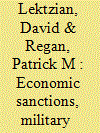

|
|
|
|
|
| Summary/Abstract |
Sanctions are designed to reduce the amount of resources available to the targeted actor and have the potential to be an effective tool for bringing disputing sides in a civil conflict to the bargaining table by altering incentives for continued fighting. Thus, there is reason to believe that sanctions can shorten the duration of civil conflicts. However, once sides in a conflict have moved to the use of violence to settle their dispute, it is hard for sanctions, in isolation, to impose enough cost to convince warring factions that settling a conflict has greater value than what could be expected from continued fighting. In this article, we argue that sanctions, in isolation, are unlikely to affect the duration of civil conflicts. However, when sanctions are combined with military interventions they can contribute to conflict management strategies resulting in shorter civil conflicts. We test our expectations empirically using data on civil conflicts from the Uppsala Conflict Data Program Armed Conflict Database and data on economic sanctions from the Threat and Imposition of Economic Sanctions Database. Our results suggest that the best hope for sanctions to shorten the duration of civil conflicts is if they are used as part of a comprehensive international response that includes institutional sanctions and military interventions.
|
|
|
|
|
|
|
|
|
|
|
|
|
|
|
|
| 2 |
ID:
146930
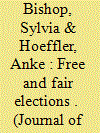

|
|
|
|
|
| Summary/Abstract |
The holding of elections has become universal but only about half of all elections are free and fair. Electoral malpractice not only distorts the quality of representation but has implications for political, social and economic outcomes. Existing datasets either provide information on election quality for a large number of elections but offer little detail, or they provide very detailed information for a small number of elections. Our data collection effort closes this gap by providing ten variables of election quality for all leadership elections for the period 1975–2011. We use these data to provide an assessment of elections that is closely tied to the commonly used term ‘free and fair’. We define ‘freeness’ of the election as the rules of the election and the process leading up to the election, and ‘fairness’ of the election refers to the events on the election day. Our data show that the quality of elections has declined over time. These electoral problems are mainly due to issues in the run-up to the elections. Using probit regressions we investigate the possible causes of election malpractice. Our analysis suggests that the freeness and the fairness of the elections are related to a number of variables, such as income, aid, executive constraints and the presence of election monitors, but that these variables have differential effects on freeness and fairness.
|
|
|
|
|
|
|
|
|
|
|
|
|
|
|
|
| 3 |
ID:
146924


|
|
|
|
|
| Summary/Abstract |
The capitalist peace thesis argues transnational economic ties have a pacifying effect on interstate relations. An extension of this literature reports that economic ties can prompt belligerents in civil conflicts to peacefully resolve their disputes and can attract third-party intervention from states with strong economic ties. This pacifying effect of economic ties, we argue, is applicable in the context of coups d’état: as a state becomes more economically interdependent with the rest of the world, the opportunity costs of domestic political disturbances are raised for both the targeted state and its financial partners. These costs – potential economic losses and a damaged economic reputation – influence belligerents in the state to use constitutional means to resolve their disputes while providing stronger incentives to foreign economic partners to influence the calculus of these belligerents as they consider the coup attempt. We test this argument quantitatively by investigating the influence of a dozen indicators of economic openness on coups in a global sample of states from 1952 to 2007. Our findings demonstrate the applicability of the capitalist peace thesis to coups d’état, manifestations of political uncertainty that are less likely to be accompanied by substantial loss of life or destruction of infrastructure.
|
|
|
|
|
|
|
|
|
|
|
|
|
|
|
|
| 4 |
ID:
146927
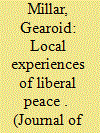

|
|
|
|
|
| Summary/Abstract |
Over the past 20 years scholars have repeatedly highlighted the complex relationship between conflict, peace and economics. It is today accepted that economic factors at the global, regional, national and local levels can promote conflict in various ways and that economic factors are therefore central in establishing a sustainable post-conflict peace. However, while the scholarly literature includes much nuance regarding the precise nature of these complex relationships, practices of peacebuilding are often far less nuanced. Instead there is a tendency to pin the hopes of fragile post-conflict states on establishing a liberalized and supposedly peace-promoting economy and a worrying absence of grounded assessments of the impacts of such policies. This article argues that the resulting lack of clarity regarding the local impacts of such peacebuilding mechanisms contributes to continued unwarranted enthusiasm for marketization among policymakers and practitioners. This issue is addressed directly by exploring the destabilizing and potentially conflict-inducing impacts of one foreign direct investment (FDI) project in rural Sierra Leone. The dominance of liberal approaches to economic policy within peacebuilding has recently combined with a surge in large-scale FDI projects, often labelled as ‘land-grabs’, which can be interpreted as a direct embodiment of the liberal peace paradigm. While the liberal peace assumes that such projects will help by paying taxes, rebuilding state capacity and employing idle young males, the article illustrates that among local populations such projects can be experienced as deeply disruptive and potentially conflict-promoting. It therefore describes four specific mechanisms by which the project in this setting endangers Sierra Leone’s still precarious transition to peace. The article concludes with recommendations for peacebuilding theorists, policy advocates and practitioners trying to navigate the difficult waters of post-conflict peacebuilding by way of large-scale FDI and marketization in general.
|
|
|
|
|
|
|
|
|
|
|
|
|
|
|
|
| 5 |
ID:
146923


|
|
|
|
|
| Summary/Abstract |
Research on the relationship between political institutions and civil war has paid insufficient attention to the role of traditional institutions in developing countries. This study presents large-N evidence showing that traditional ethnic institutions with origins prior to Western colonization are associated with the prevalence of civil wars in Africa after independence. Matching ethnographic data on the pre-colonial political organization of African indigenous groups to contemporary data on ethnic groups in conflict, I investigate the relationship between the traditional organization of ethnic groups and ethnic civil wars in Africa after decolonization. Specifically, I argue that excluded groups with centralized traditional institutions can rely on these institutions to more credibly bargain with the state, and that this reduces their risk of conflict. Accordingly, I find that excluded groups with centralized pre-colonial institutions are less likely to be involved in civil wars.
|
|
|
|
|
|
|
|
|
|
|
|
|
|
|
|
| 6 |
ID:
146929
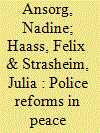

|
|
|
|
|
| Summary/Abstract |
This article presents new data on provisions for police reform in peace agreements (PRPA) between 1975 and 2011. The PRPA dataset complements past research on the determinants and effects of specific terms in agreements with detailed data on police reform provisions. The PRPA dataset also adds a quantitative dimension to the thus far largely qualitative literature on post-conflict security sector reform (SSR). It includes information on six subtypes of police reform: capacity, training, human rights standards, accountability, force composition and international training and monitoring. We show that there is currently a high global demand for the regulation of police reform through peace agreements: police reform provisions are now more regularly included in agreements than settlement terms that call for power-sharing or elections. We observe interesting variations in the inclusion of police reform provisions in relation to past human rights violations, regime type, or the scope of international peacekeeping prior to negotiations, and illustrate the implications of police reform provisions for the duration of post-conflict peace. Finally, we stimulate ideas on how scholars and policymakers can use the PRPA dataset in future to study new questions on post-conflict police reform.
|
|
|
|
|
|
|
|
|
|
|
|
|
|
|
|
| 7 |
ID:
146928
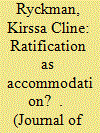

|
|
|
|
|
| Summary/Abstract |
Repression is the expected response to anti-government protest; however, leaders can also accommodate demonstrators. Committing to human rights treaties is considered in this environment, where treaty commitments are conceptualized as a policy concession that leaders can grant dissenters. Past research has shown that top-down domestic pressures, such as new democratic regimes, can influence treaty commitments. This article extends this line of research by considering the influence of bottom-up domestic pressure, arguing that nonviolent, pro-democracy movements can pressure leaders into concessions, as these movements are risky to repress but threatening to ignore. Leaders are expected to seek ‘cheap’ accommodations, and commitments to human rights treaties provide a relatively low-cost concession that also addresses demonstrators’ pro-democracy demands. Using commitments to the nine core UN human rights treaties, results are generally supportive. Governments experiencing a nonviolent, pro-democracy movement are consistently likely to sign human rights treaties. Ratification is also likely but in more limited contexts, and is more closely related to movement success. This suggests that bottom-up pressures can influence commitment to human rights treaties, but there may be little substance behind those concessions. The status quo and cost-averse preferences of leaders lead them to grant accommodations that result in minimal change and cost.
|
|
|
|
|
|
|
|
|
|
|
|
|
|
|
|
| 8 |
ID:
146925


|
|
|
|
|
| Summary/Abstract |
This article investigates the effect of natural resources on whether ethno-political groups choose to pursue their goals with nonviolent as compared to violent means, distinguishing terrorism from insurgencies. It is hypothesized that whether or not the extraction of fossil fuels sparks violence depends both on the group’s characteristics and the state’s reaction. Data are taken from the Minorities at Risk Organizational Behavior (MAROB) project, covering 118 organizations in 13 countries of the Middle East and North Africa over the 1980–2004 period. The multinomial logit models combine group- and country-specific information and show that ethno-political groups are more likely to resort to rebellion rather than using nonviolent means or becoming terrorists when representing regions rich in oil. This effect is enhanced for groups already enjoying regional autonomy or being supported by a foreign state but can be mitigated by power-sharing arrangements. These results are thus in line with the argument that economic considerations, or ‘greed’, dominate over political considerations, or ‘grievances’, with regard to violent conflicts. The opposite appears to hold considering terrorism, as we do not find any evidence for a resource curse here, but find an increasing effect of political discrimination and a decreasing effect of regional autonomy.
|
|
|
|
|
|
|
|
|
|
|
|
|
|
|
|
|
|
|
|
|